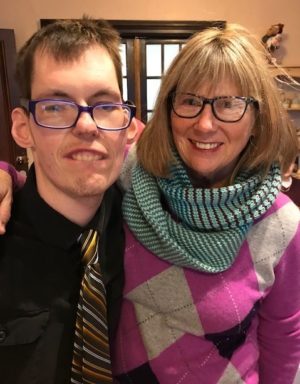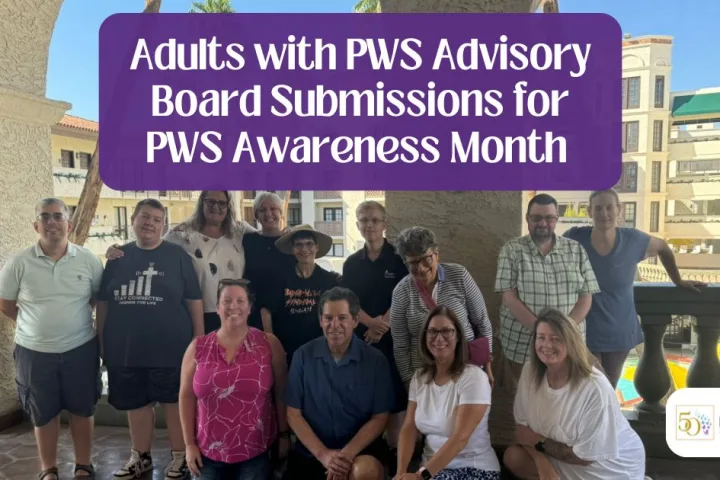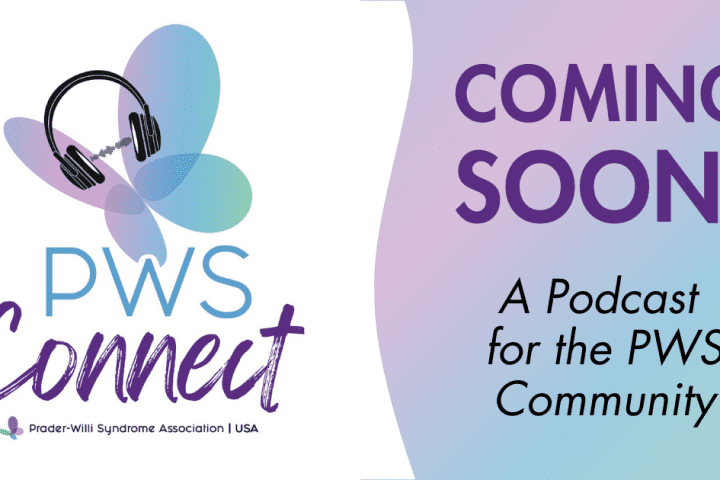When our son, Robert, was born almost thirty-one years ago, we had no diagnosis. Seven years later a new blood test confirmed Prader-Willi syndrome. It was not a good day for our family, and from what I understand, it is not a good day for any family (then or now) facing a new diagnosis. I was sure when our son was born that we were going to “fix this.” I wrote in my book Raising Robert that denial and I were particularly good friends.
Years have passed and our son is now a grown man. Life has not been easy for any of us. There have been challenging behaviors, outbursts, weight gain, scoliosis, hospitalizations, and worry. I am happy much of that is in the past for Robert, and I think, for some of the people who are his cohorts.
I recently signed up to participate in Path for PWS. For those of you who are not aware of this study, it is online data collection for people with the syndrome. Their brochure states “Path for PWS is a study to help us better understand serious medical events in PWS over a 4-year period, as well as evaluate how PWS related behaviors change over time. The data from this study is intended to inform the development and clinical trial design of potential new treatments.” To participate, you fill out surveys about the person with PWS over time.
Now for the “Good News.” You can view graphs after you have completed your survey. This has data from other parents and caregivers taking the survey. As I have stated in the past, I am not a trained medical person, but this is what I interpreted from the graphs; many of the behaviors that drive caregivers to distraction decrease in frequency as the person with the syndrome ages. That includes tantrums, aggressiveness, lying, stubbornness, and difficulty in transitioning.
Many of you will be encouraged by this, especially if you are in the middle of teen years. The behaviors start to decrease in the twenties just like contemporaries. I have been told by a respected psychologist who treats adolescents that brains are not fully developed until twenty-five. We see young adults without the syndrome making better choices in their twenties as well.
The other information I gathered from the surveys was that many of the people with the syndrome have delightful qualities. They are creative, grateful, friendly, spiritual, kind, have a desire to please others, and love to learn.
This data will be used in a variety of ways. Whenever I hear of Chromosome research I think, “Wouldn’t it be wonderful if someday they could replace the deletion that causes Prader-Willi Syndrome?” As I have stated before, learning to live with what is instead of what you wish it was is important. It is possible my interpretation of the data is not correct, but maybe it is.
Contributed by Janet Favorite
https://www.janetfavorite.com/)
A Note About the Global PWS Registry
New participants are always welcome in the Global PWS Registry. Join over 2000 PWS families enrolled worldwide who contribute to this natural history study. To create your account visit www.PWSRegistry.org. If you have questions or need assistance, please call (760)420-5878 or email info@PATHforPWS.com.





 Perry A. Zirkel has written more than 1,500 publications on various aspects of school law, with an emphasis on legal issues in special education. He writes a regular column for NAESP’s Principal magazine and NASP’s Communiqué newsletter, and he did so previously for Phi Delta Kappan and Teaching Exceptional Children.
Perry A. Zirkel has written more than 1,500 publications on various aspects of school law, with an emphasis on legal issues in special education. He writes a regular column for NAESP’s Principal magazine and NASP’s Communiqué newsletter, and he did so previously for Phi Delta Kappan and Teaching Exceptional Children. Jennifer Bolander has been serving as a Special Education Specialist for PWSA (USA) since October of 2015. She is a graduate of John Carroll University and lives in Ohio with her husband Brad and daughters Kate (17), and Sophia (13) who was born with PWS.
Jennifer Bolander has been serving as a Special Education Specialist for PWSA (USA) since October of 2015. She is a graduate of John Carroll University and lives in Ohio with her husband Brad and daughters Kate (17), and Sophia (13) who was born with PWS. Dr. Amy McTighe is the PWS Program Manager and Inpatient Teacher at the Center for Prader-Willi Syndrome at the Children’s Institute of Pittsburgh. She graduated from Duquesne University receiving her Bachelor’s and Master’s degree in Education with a focus on elementary education, special education, and language arts.
Dr. Amy McTighe is the PWS Program Manager and Inpatient Teacher at the Center for Prader-Willi Syndrome at the Children’s Institute of Pittsburgh. She graduated from Duquesne University receiving her Bachelor’s and Master’s degree in Education with a focus on elementary education, special education, and language arts. Evan has worked with the Prader-Willi Syndrome Association (USA) since 2007 primarily as a Crisis Intervention and Family Support Counselor. Evans works with parents and schools to foster strong collaborative relationships and appropriate educational environments for students with PWS.
Evan has worked with the Prader-Willi Syndrome Association (USA) since 2007 primarily as a Crisis Intervention and Family Support Counselor. Evans works with parents and schools to foster strong collaborative relationships and appropriate educational environments for students with PWS. Staci Zimmerman works for Prader-Willi Syndrome Association of Colorado as an Individualized Education Program (IEP) consultant. Staci collaborates with the PWS multi-disciplinary clinic at the Children’s Hospital in Denver supporting families and school districts around the United States with their child’s Individual Educational Plan.
Staci Zimmerman works for Prader-Willi Syndrome Association of Colorado as an Individualized Education Program (IEP) consultant. Staci collaborates with the PWS multi-disciplinary clinic at the Children’s Hospital in Denver supporting families and school districts around the United States with their child’s Individual Educational Plan. Founded in 2001, SDLC is a non-profit legal services organization dedicated to protecting and advancing the legal rights of people with disabilities throughout the South. It partners with the Southern Poverty Law Center, Protection and Advocacy (P&A) programs, Legal Services Corporations (LSC) and disability organizations on major, systemic disability rights issues involving the Individuals with Disabilities Education Act (IDEA), Americans with Disabilities Act (ADA), and the federal Medicaid Act. Recently in November 2014, Jim retired.
Founded in 2001, SDLC is a non-profit legal services organization dedicated to protecting and advancing the legal rights of people with disabilities throughout the South. It partners with the Southern Poverty Law Center, Protection and Advocacy (P&A) programs, Legal Services Corporations (LSC) and disability organizations on major, systemic disability rights issues involving the Individuals with Disabilities Education Act (IDEA), Americans with Disabilities Act (ADA), and the federal Medicaid Act. Recently in November 2014, Jim retired.